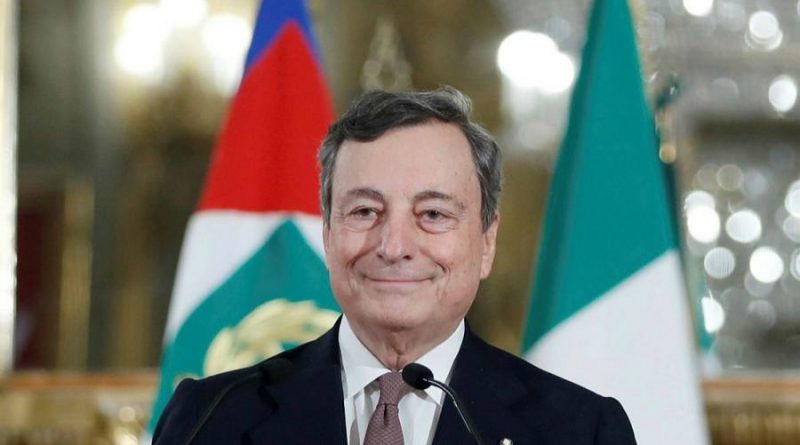Italian PM Mario Draghi & his new government wins vote of confidence in Parliament.
Italian Prime Minister Mario Draghi on Thursday night secured final parliamentary approval for his government, meaning he can now focus on dealing with the country’s unprecedented health and economic crisis.
The lower house, the Chamber of Deputies, overwhelmingly backed the former European Central Bank (ECB) chief and his cabinet team of technocrats and politicians, with 535 votes in favor, 56 against and five abstentions.
Given that nearly all parties have lined up behind the new executive, the near-unanimous result was not a surprise.
On Wednesday, Draghi easily won a first vote of confidence in the Senate, the upper chamber, by a 262-40 margin, with two abstentions.
After securing the overwhelming support of the Senate for his national unity government late Wednesday, the former European Central Bank (ECB) chief was expected to win the backing of the lower house, the Chamber of Deputies.
Draghi is taking over at a particularly difficult time for Italy, where the coronavirus pandemic has killed almost 100,000 people and sent the economy plunging by a record 8.9 per cent last year.
“There has never been in my long professional life a moment of such intense emotion and so much responsibility,” the 73-year-old economist said in his inaugural speech at the Senate.
The upper chamber late Wednesday backed the new government by a 262-40 margin, with two abstentions.
Given that nearly all parties support him, Draghi was expected to secure equally wide support in the lower house on Thursday evening.
He has pledged to use “all means” to fight the pandemic, starting with a faster vaccination programme. He also sketched out an ambitious reform plan, in line with European Union expectations.
“DELICATE NEGOTIATIONS”
The bloc is set to help Italy’s recovery with more than 200 billion euros (US$240 billion) in loans and grants during 2021-2026, but in return expects the country to address long-standing structural issues.
Draghi promised to reform Italy’s stifling bureaucracy, labyrinthine tax code and snail-paced justice system, as well as a focus on education, closing the gap on female employment and fighting climate change.
The ex-ECB chief was unexpectedly called in to solve Italy’s political crisis two weeks ago, after the implosion of Giuseppe Conte’s previous centre-left government.
The man known as “Super Mario” for helping save the euro while at the ECB has since won surprisingly wide political backing, including from the far-right, eurosceptic League of Matteo Salvini.
“Me and the League have complete confidence in your government,” Salvini said in the Senate debate, after Draghi warned that supporting him also meant signing up to a more integrated EU and the idea that the euro single currency is irreversible.
UNEASY MIX
The ruling coalition also includes the formerly anti-establishment Five Star Movement (M5S), the centre-left Democratic Party (PD), and the parties of ex-premiers Silvio Berlusconi and Matteo Renzi.
The mix is an uneasy one, especially for the M5S. Fifteen of its senators rebelled on Wednesday and voted against the new government, and were told Thursday they would be expelled.
According to Wolfango Piccoli, co-president of the Teneo consultancy, said Draghi will need “delicate negotiations to persuade his political backers” to implement his agenda.
Parties have “traditionally pursued policies radically opposed (to Draghi’s ideas) on multiple fronts, including the role of the state in the economy, corporate interventionism and taxation”, he said.
So, his “first 100 days in office should provide a good sense of what is achievable or not, especially concerning reforms that have been side-lined for decades”, Piccoli concluded.
Italy’s President Sergio Mattarella asked Mario Draghi to be premier after the previous administration, led by Giuseppe Conte, collapsed amid a row over how to spend an EU economic recovery fund.
Nick-named “Super Mario” for his role in saving the euro currency, Draghi is a highly respected figure and his appointment has been greeted with delight by most political observers.His cabinet contains a mixture of figures from across the political spectrum and several non-affiliated technocrats. Luigi Di Maio, a leader of the populist 5-Star Movement remains as foreign minister while Giancarlo Giorgetti, a senior figure in the rightwing League party, becomes industry minister. The economy ministry has gone to Daniele Franco, the current director-general of the Bank of Italy.
Draghi also agreed to install a new ministry of “ecological transition” which helped to win over the 5-Star Movement for whom green issues are core concerns.
The premier’s next step will be to unveil his policy plans during debates in both houses of parliament where he will face two votes of confidence that are seen as a formality given his cross-party backing.
One of the reasons so many parties have joined forces in the new coalition is that they all want to have a say in how Italy spends more than 200 billion euros it is set to receive from the EU post-Covid economic recovery fund. The nation is suffering its worst recession since World War Two as a result of the lockdowns triggered by the coronavirus pandemic.
Italy is still grappling with the virus and has registered over 93,000 deaths linked to Covid-19, the second-highest toll in Europe.
For the moment Draghi enjoys widespread support with some in the national media describing him as a “new Italian miracle”. However, he faces a daunting task to revive Italy’s fortunes and not fall prey to the frequent squabbles among the nation’s political factions that has brought down many a government in the past.
Source: AFP
